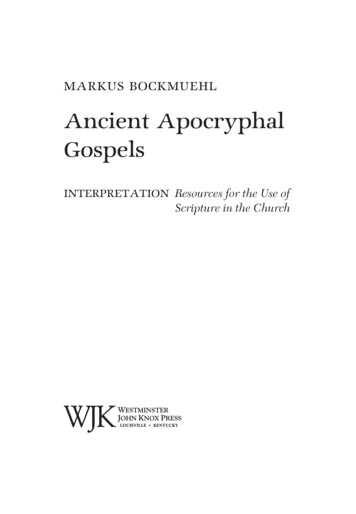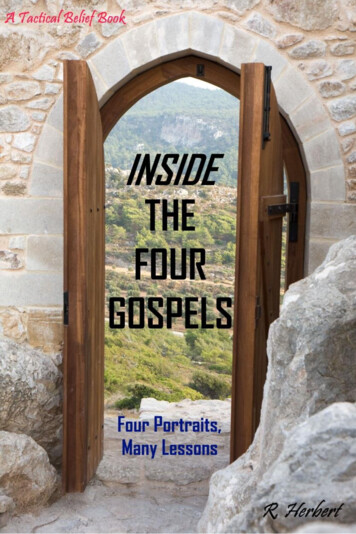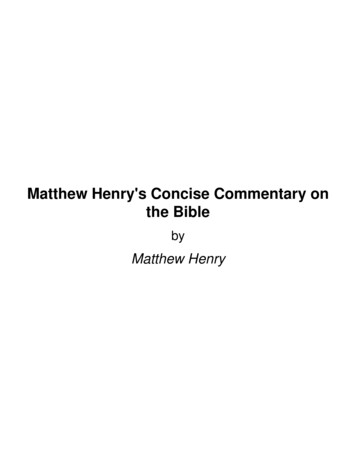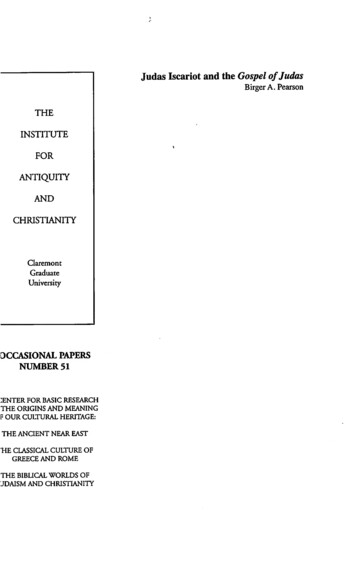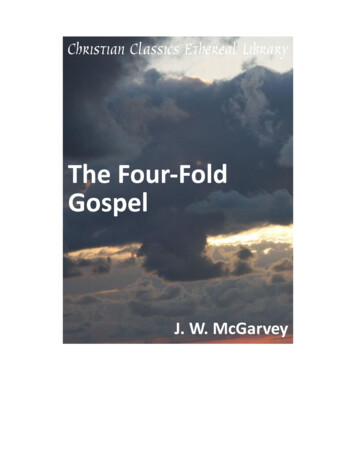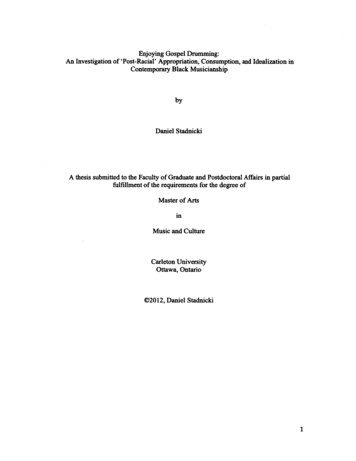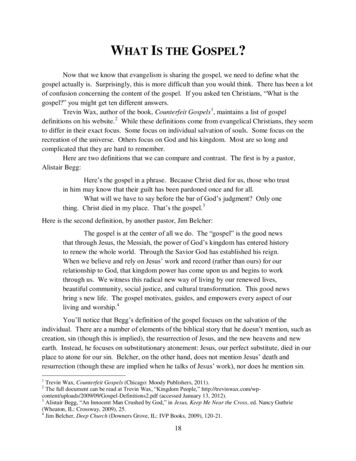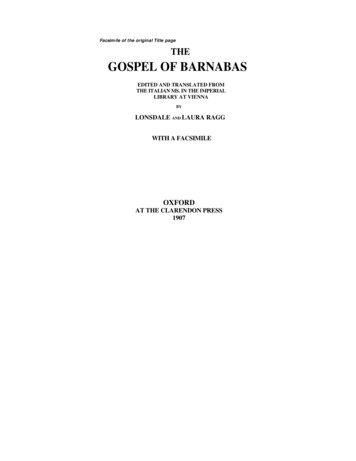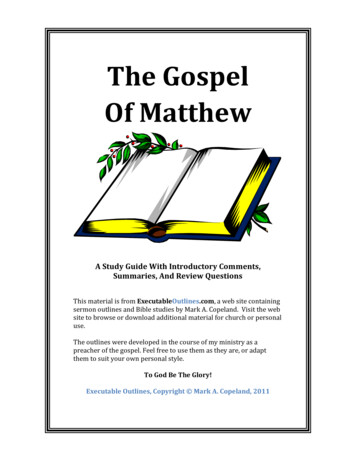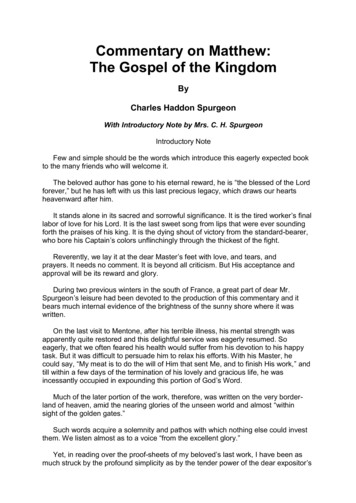
Transcription
Commentary on Matthew:The Gospel of the KingdomByCharles Haddon SpurgeonWith Introductory Note by Mrs. C. H. SpurgeonIntroductory NoteFew and simple should be the words which introduce this eagerly expected bookto the many friends who will welcome it.The beloved author has gone to his eternal reward, he is “the blessed of the Lordforever,” but he has left with us this last precious legacy, which draws our heartsheavenward after him.It stands alone in its sacred and sorrowful significance. It is the tired worker’s finallabor of love for his Lord. It is the last sweet song from lips that were ever soundingforth the praises of his king. It is the dying shout of victory from the standard-bearer,who bore his Captain’s colors unflinchingly through the thickest of the fight.Reverently, we lay it at the dear Master’s feet with love, and tears, andprayers. It needs no comment. It is beyond all criticism. But His acceptance andapproval will be its reward and glory.During two previous winters in the south of France, a great part of dear Mr.Spurgeon’s leisure had been devoted to the production of this commentary and itbears much internal evidence of the brightness of the sunny shore where it waswritten.On the last visit to Mentone, after his terrible illness, his mental strength wasapparently quite restored and this delightful service was eagerly resumed. Soeagerly, that we often feared his health would suffer from his devotion to his happytask. But it was difficult to persuade him to relax his efforts. With his Master, hecould say, “My meat is to do the will of Him that sent Me, and to finish His work,” andtill within a few days of the termination of his lovely and gracious life, he wasincessantly occupied in expounding this portion of God’s Word.Much of the later portion of the work, therefore, was written on the very borderland of heaven, amid the nearing glories of the unseen world and almost “withinsight of the golden gates.”Such words acquire a solemnity and pathos with which nothing else could investthem. We listen almost as to a voice “from the excellent glory.”Yet, in reading over the proof-sheets of my beloved’s last work, I have been asmuch struck by the profound simplicity as by the tender power of the dear expositor’s
comments. Surely the secret of his great strength lay in this, that he was willing tosay what God put in his heart and did not seek to use “enticing words of man’swisdom.”Although the Master’s call to His faithful servant came before he could completethe revision of his manuscripts, the concluding pages have been compiled, withloving care, entirely from his own spoken and written words, by the dear friend whowas most closely associated with him in all his work for God.S. S.Westwood, Beulah Hill,Upper Norwood, January, 1893.Table of ContentsChapter 1:1-17The Pedigree of the KingChapter 1:18-25The Birth of the KingChapter 2The King Appearing and the King AssailedChapter 3:1-12The Herald of the KingChapter 3:13-17The King Designated and AnointedChapter 4:1-11The King Begins His Reign by A Combat WithThe Prince of DarknessChapter 4:12-25The King Setting UpChapter 5:1-12The King Promulgates the Laws of His KingdomChapter 5:17-20Our King Honors His Father’s LawChapter 5:21-37The King Corrects Traditional LawChapter 6:1-18The King Contrasts the Laws of His KingdomWith The Conduct of Outward Religionists in the MattersofAlms and PrayerChapter 6:19-34The King Gives Commands as to the Cares of This LifeChapter 7:1-12SubjectsThe King Continues to Regulate the Behavior of HisChapter 7:13-23DistinguishThe King Teaches His Servants to Discern and toChapter 7:24-29The King Sums Up His Discourse
Chapter 8:1-18The King, Having Spoken in Wisdom, Works with PowerChapter 8:19-22Our King Discerning His True FollowersChapter 8:23-27Our King Ruling the SeaChapter 8:28-34The King Driving Legions Before Him.Chapter 9:1-8The King Continues to Display His Royal PowerChapter 9:9-13The Grace of the KingdomChapter 9:14-17The Joy of the KingdomChapter 9:18-26The King’s Dominion Over Disease and DeathChapter 9:27-31The King’s Touch Healing the BlindChapter 9:32-35The King and Those Possessed with DevilsChapter 9:36-38The King Pitying the MultitudesChapter 10:1-15The King Commissioning His officersChapter 10:16-25 The King’s Messengers May Expect to Be MaltreatedChapter 10:26-42 The King Cheering His ChampionsChapter 11:1-19The King Supports His Messengers by His OwnAppearing the King Vindicates and Cheers His HeraldChapter 11:20-30 The King’s Warnings, Rejoicings, and InvitationsChapter 12:1-13Our King as Lord of the SabbathChapter 12:14-21 Our King in the Majesty of His PeacefulnessChapter 12:22-37 Our King and the Powers of DarknessChapter 12:38-42 Our King Challenged to Give a SignChapter 12:43-45 Our King Unveiling the Tactics of the Arch-EnemyChapter 12:46-50 Our King and His Earthly RelativesChapter 13:1-53Our King Sets Forth Seven Parables of His KingdomChapter 13:54-58 The King in His Own CountryChapter 14:1-12The King’s Herald Slain
Chapter 14:13-22 Our King Gives a Great BanquetChapter 14:23-26 The King Ruling Winds and WavesChapter 15:1-20Our King Combating FormalistsChapter 15:21-28 Our King and the Woman of CanaanChapter 15:29-39 The King Gives Another BanquetChapter 16:1-4The King and His Chosen Sign.Chapter 16:5-12The King Misunderstood by His OwnChapter 16:13-28 The King Alone with His FriendsChapter 17:1-13Our King Transfigured in GloryChapter 17:14-21 The King Returning to the Field of ConflictChapter 17:22-23 Again the King Speaks of His DeathChapter 17:24-27 Our King and the Tribute MoneyChapter 18:1-5The King Arranges Rank in His KingdomChapter 18:6-14Our King’s Warning Against Offenses,Especially Those Which Injure the Little OnesChapter 18:15-35 The King’s Law Concerning OffensesChapter 19:1-12The King and the Marriage LawsChapter 19:13-15 The Great King Among the Little ChildrenChapter 19:16-30 The King Settles the Order of PrecedenceChapter 20:1-16A Parable of the KingdomChapter 20:17-28 The King On His Way to the CrossChapter 20:29-34 The King Opening the Eyes of the BlindChapter 21:1-11The King Rides Triumphantly into His CapitalChapter 21:12-14 The King Cleanses the TempleChapter 21:15-16 The King Acknowledges the Children’s AcclamationsChapter 21:17-22 The King Gives a Token of the Judgment ofJerusalem and of The Power of Prayer
Chapter 21:23-32 The King Confounds and Warns His EnemiesChapter 21:33-44 The King Makes His Enemies Judge ThemselvesChapter 21:45-36 The King’s Enemies Plot Against HimChapter 22:1-14Parable of the Marriage of the King’s SonChapter 22:15-22 The King’s Enemies Try to Ensnare HimChapter 22:23-33 The King and the SadduceesChapter 22:34-40 The King Tested by a LawyerChapter 22:41-46 The King Asking QuestionsChapter 23:1-12The King’s Warning Against False TeachersChapter 23:13-33 The King Pronouncing WoesChapter 23:34-39 The King’s Farewell to His CapitalChapter 24:1-2The King and His Father’s HouseChapter 24:3-31The King Answers Difficult QuestionsChapter 24:32-41 The King Spears of the Time of His ComingChapter 24:42-51 The King Commands His Servants to WatchChapter 25:1-13The King and His Marriage ProcessionChapter 25:14-30 The Parable of the TalentsChapter 25:31-46 The Royal and Universal JudgeChapter 26:1-5The King Prophesying—His Enemies PlottingChapter 26:6-13The King Anointed for His BurialChapter 26:14-16 The Betrayer’s BargainChapter 26:17-30 The Last Passover and the New MemorialChapter 26:31-35 The King Again Prophesying—Peter ProtestingChapter 26:36-46 The King Beneath the Olive TreesChapter 26:47-56 The King’s Betrayal
Chapter 26:57-68 The King Before the Jewish High PriestChapter 26:69-75 The King Denied by His DiscipleChapter 27:1-2The King Taken to PilateChapter 27:3-10The Traitor’s Remorse and SuicideChapter 27:11-26 Jesus—Pilate—BarabbasChapter 27:27-31 The King Mocked by the SoldiersChapter 27:32-38 The King CrucifiedChapter 27:39-49 Mocking the Crucified KingChapter 27:50-54 “It Is Finished”Chapter 27:55-61 The King’s Faithful FriendsChapter 27:62-66 Guarding the King’s SepulchreChapter 28:1-7The Empty SepulchreChapter 28:8-10The Risen KingChapter 28:11-15 Falsehood and BriberyThe Gospel According ToMatthewChapter 1Matthew 1:1-17The Pedigree of the King1. The book of the generation of Jesus Christ, the son of David, the son ofAbraham.This verse gives us a clue to the special drift of Matthew’s Gospel. He was movedof the Holy Spirit to write of our Lord Jesus Christ AS KING—“the son of David.” He isto be spoken of as specially reigning over the true seed of Abraham, hence He iscalled, “the son of Abraham.” Lord Jesus, make us each one to call Thee, “My Godand King!” As we read this wonderful GOSPEL OF THE KINGDOM may we be full ofloyal obedience and pay Thee humble homage! Thou art both a King and a King’sSon.
The portion before us looks like a string of names and we might fancy that itwould yield us little spiritual food, but we may not think lightly of any line of theinspired volume. Here the Spirit sets before us the pedigree of Jesus and sketchesthe family tree of “the King of the Jews.” Marvelous condescension, that He shouldbe a man and have a genealogy, even HE who “was in the beginning with God,” and“thought it not robbery to be equal with God”! Let us read each line of “The book ofthe generation” with adoring gratitude that we have a King who is one with us in ournature—“in ties of blood with sinners one.”2. Abraham begat Isaac; and Isaac begat Jacob; and Jacob begat Judas andhis brethren.With Abraham was the covenant made that in his seed should all the nations ofthe earth be blessed. The line ran not in Ishmael, the offspring of the flesh, but inIsaac, who was born after the promise and by the divine purpose it flowed in electJacob and not in the firstborn, Esau. Let us observe and admire the sovereignty ofGod. Our Lord sprang out of Judah, of which tribe nothing is said concerning thepriesthood, that it might be clear that His priesthood is “not after the law of a carnalcommandment, but after the power of an endless life.” Yet comes He of Judah’sroyal tribe, for He is King.3, 4. And Judas begat Phares and Ezra of Thamar; and Phares begatEsrom; and Esrom begat Aram; and Aram, begat Aminadab; and Aminadabbegat Naamon; and Naamon begat Salmon.Observe the dash of unclean blood which enters the stream throughJudah’s incest with Thamar. O Lord, thou art the sinner’s Friend!5. And Salmon begat Booz of Rachab; and Booz begat Obed of Ruth; and Obedbegat Jesse.We note that two women are mentioned in this fifth verse, a Canaanite and aMoabitess. Thus Gentile blood mingled with the Hebrew strain. Our King has come tobreak down the partition wall. As Gentiles, we rejoice in this. Jesus is heir of a line inwhich flows the blood of the harlot Rahab and of the rustic Ruth. He is akin to thefallen and to the lowly, and He will show His love even to the poorest and mostobscure. I, too, may have part and lot in Him.6-9. And Jesse begat David the king; and David the king begat Solomon of herthat had been the wife of Urias; and Solomon. begat Roboam; and Roboam begatAbia; and Abia begat Asa; and Asa begat Josaphat; and Josaphat begat Joram; andJoram begat Ozias; and Ozias begat Joatham; and Joatham begat Achaz; andAchaz begat Ezekias.Well may our hearts melt at the memory of David and Bathsheba! The fruit oftheir unholy union died, but after repentance, she who “had been the wife of Uria”became the wife of David and the mother of Solomon. Signal was the grace of Godin this case that the line should be continued in this once guilty pair, but oh, whatkinship with fallen humanity does this indicate in our Lord! We will not pry into the
mystery of the incarnation, but we must wonder at the condescending grace whichappointed our Lord such a pedigree.10. And Ezekias begat Manasses; and Manasses begat Amon; and Amonbegat Josias.A line of kings of a mixed character—not one of them perfect and some of themas bad as bad could be. Three are left out altogether, even sinners who were only fitto be forgotten were in the line of this succession, and this shows how little can bemade of being born of the will of man or of the will of the flesh. In this special line ofdescent, salvation was not of blood, nor of birth. Specially let us think of such a oneas Manasses being among the ancestors of our Lord, as if to hint that, in the linewhich comes after Him, there would be some of the chief of sinners who would bemiracles of mercy. Again we say, how near does Jesus come to our fallen race bythis His genealogy!11. And Josias begat Jechonias and his brethren, about the time they werecarried away to Babylon.Poor captives, and those who are bound with the fetters of sin, may see somelike themselves in this famous ancestry. They are prisoners of hope, now that theChrist is born of a race which was once “carried away to Babylon.”12-16. And after they were brought to Babylon, Jechonias begat Salathiel; andSalathiel begat Zorobabel; and Zorobabel begat Abiud; and Abiud begat Eliakim; andEliakim begat Azor; and Azor begat Sadoc; and Sadoc begat Achim; and Achimbegat Eliud; and Eliud begat Eleazar; and Eleazar begat Matthan; and Matthan begatJacob; and Jacob begat Joseph the husband of Mary, of whom was born Jesus, whois called Christ.With one or two exceptions these are names of persons of little or no note. Thelater ones were persons altogether obscure and insignificant. Our Lord was “a rootout of dry ground,” a shoot from the withered stem of Jesse. He set small store byearthly greatness. He must needs be of human race, but He comes to a family whichwas of low estate and there finds His reputed father, Joseph, a carpenter ofNazareth. He is the poor man’s King. He will not disdain any of us though our father’shouse be little in Israel. He will condescend to men of low estate.Wonder surpassing all wonders—the Word, by whom all things were made, wasHimself made flesh and dwelt among us! He was born of a human mother, even ofthe lowly virgin, Mary. “Forasmuch then as the children are partakers of flesh andblood, He also Himself likewise took part of the same.” Our hearts would anoint withsweet perfume of love and praise the blessed head of Him “who is called Christ,” theAnointed One.17. So all the generations from Abraham to David are fourteen generations; andfrom David until the carrying away into Babylon are fourteen generations; and fromthe carrying away into Babylon unto Christ are fourteen generations.The Holy Ghost led His servant Matthew to adopt a rough and simple method tohelp weak memories. Here are three fourteens. Let us learn from this to make
ourselves familiar with our Lord’s pedigree and think much of His being born into theworld. Specially let us see that He was literally of the house of David and the seed ofAbraham, for many prophecies in the Old Testament pointed to this fact. He is trulythe Messiah, the Prince, which was to come.Matthew 1:18-25The Birth of the King18. Now the birth of Jesus Christ was on this wise: When as his mother Marywas espoused to Joseph, before they came together, she was found with child ofthe Holy Ghost.A word or two sufficed to describe the birth of all the kings whose names wehave read, but for our Lord Jesus Christ there is much more to be said. Theevangelist girds himself up for his solemn duty and writes, “Now the birth of JesusChrist was on this wise.” It is a deep, mysterious, and delicate subject, fitter forreverent faith than for speculative curiosity. The Holy Ghost wrought in the chosenvirgin the body of our Lord. There was no other way of His being born, for had Hebeen of a sinful father, how should He have possessed a sinless nature? He is bornof a woman, that He might be human, but not by man that He might not be sinful.See how the Holy Ghost co-operates in the work of our redemption by preparing thebody of our Lord!19. Then Joseph her husband, being a just man, and not willing to make her apublic example, was minded to put her away privily.Mary was espoused to him and he was saddened and perplexed when helearned that she would become a mother before they had been actually married.Many would have thrust her away in indignation and put her to an open shame, butJoseph was of royal mind as well as royal race. He would not expose what hethought to be the sin of his espoused wife—although he felt that she must be putaway, he would do it quietly. When we have to do a severe thing, let us choose thetenderest manner. May be, we shall not have to do it at all.20. But while he thought on these things, behold, the angel of the Lord appearedunto him in a dream, saying, Joseph, thou son of David, fear not to take unto theeMary thy wife: for that which is conceived in her is of the Holy Ghost.He could not but feel very anxious and no doubt he prayed about these thingsboth day and night. God would not leave the honor of the chosen virgin-motherwithout protection. Soon Joseph had the best of guidance.From heaven, he had the assurance that Mary had not sinned, but had beenfavored of the Lord. Joseph is reminded of his royal rank, “thou son of David,” and isbidden to cast away his fear. How he must have been comforted by the Lord’s “fearnot”! He was to take Mary under his tender care and be a foster-father to the Sonwho would be born of her.Mary must have been in great anxiety herself as to whether her story of angelicvisitation would be believed, for it looked improbable enough. We doubt not that faith
sustained her, but she needed much of it. Every great favor brings a great trial with itas its shadow and becomes thus a new test of faith. The Lord very graciouslyremoved all suspicion from Joseph’s mind and thus provided for the honor of themother and for the comfort of the holy child. If Jesus is born in our hearts, we shallhave trouble, but the Lord will witness that Christ is ours and He will surely bear usthrough.21. And she shall bring forth a son, and thou shalt call his name JESUS: for heshall save his people from their sins.The Lord of glory is born the Son of man and is named by God’s command, andby man’s mouth, JESUS the Savior. He is what He is called.HE saves us from the punishment and the guilt of sin and then from the ill effectand evil power of sin. This He does for “his people,” even for all who believe in Him.It is His nature to do this, as we see in the fact that His very name is JESUS—Savior. We still call Him by that name, for He still saves us in these latter days. Letus go and tell out His name among men, for He will save others.22, 23. Now all this was done, that it might be fulfilled which was spoken of theLord by the prophet, saying, Behold, a virgin shall be with child, and shall bring fortha son, and they shall call his name EMMANUEL, which being interpreted, God withus.Who would have thought that the prophecy contained in Isaiah 7:14 could havereferred to our Lord? One of these days, we shall discover a great deal more in theinspired Word than we can see today. Perhaps it is needful to our understanding aprophecy that we should see it actually fulfilled. What blind eyes we have!It is pleasant to mark that, according to this verse and the twenty-first,EMMANUEL and JESUS mean the same thing. “God with us” is our Savior. He iswith us as God on purpose to save us. The incarnation of Jesus is our salvation.To cheer Joseph and decide his mind, Holy Scripture is brought to hisremembrance and truly, when we are in a dilemma, nothing gives us such confidencein going forward as the sacred oracles impressed upon the heart. How conversantwas Joseph with the prophets to have their words before him in a dream! Lord,whether I read Thy Word when awake or have it brought to my memory in my sleep,it is always precious to me! But Thou, Lord Jesus, God with us, art dearer still and thewritten Word is chiefly precious because it speaks of Thee, the incarnate Word.24, 25. Then Joseph being raised from sleep did as the angel of the Lord hadbidden him, and took unto him a wife: and knew her not till she had brought forthher firstborn son: and he called his name JESUS.Joseph was not disobedient to the heavenly vision in any respect. He did notdelay, but as soon as he rose he “did as the angel of the Lord had bidden him.”Without delay, demur, or reservation, he obeyed. What holy awe filled his heart as hewelcomed the favored virgin to his home, to be respectfully and affectionatelyscreened from all evil! What must he have thought when he saw the Son of theHighest lying on the bosom of her whom he had espoused! He was happy to render
any service to the newborn King. Since he accepted Mary as his espoused wife, herchild was the heir of Joseph and so of David, and thus was by right the King of theJews. Our Lord Jesus had a birthright by His mother, but His right on the father’s sidewas, by Joseph’s act and deed, also put beyond dispute.Let us leave this wonderful passage worshipping the Son of God, whocondescended to be born the Son of man. Thus our God became our brother, boneof our bone, and flesh of our flesh. The nearer He comes to us, the more humblylet us adore Him. The more true the kinship of our King, the more enthusiasticallylet us crown Him Lord of all!Chapter 2The King Appearing and the King Assailed1. Now when Jesus was born in Bethlehem of Judea in the days of Herod theking, behold, there came wise men from the east to Jerusalem, saying, Where is hethat is born King of the Jews? for we have seen his star in the east, and are come toworship him.The King is born and now He must be acknowledged. At the same moment Hewill be assailed. His birth was in the days of another king, of Edomite stock, who hadusurped the throne of David. The world’s kingdom is opposed to that of our Lord.Where Jesus is born there is sure to be a Herod in power. It is a marvelous thing thatMagi from afar should know that a great king was born and should come from sogreat a distance to do Him homage, for the world’s wise men are not often foundbowing at the feet of Jesus. When wise men seek our King, they are wise indeed.These were devout men to whom the stars spoke of God. An unusual luminary wasunderstood by them to indicate the birth of the Coming Man for whom many in alllands were looking. Stars might guide us if we were willing to be led. Lord Jesus,make everything speak to me concerning Thee and may I be truly led till I find Thee!The wise men were not content with having “seen his star,” they must seeHimself and seeing, they must adore. These were not in doubt as to His Godhead.They said, “We are come to worship him.” Lord, I pray Thee, make all the wise mento worship Thee!3. When Herod the king had heard these things, he was troubled, and allJerusalem with him.Herod is expressly called, “Herod the king.” In that capacity, he is the enemy ofour King. They are in a sad state to whom the Savior is a trouble. Some, like Herod,are troubled because they fear that they shall lose position and honor if true religionmakes progress and many have an undefined dread that the presence of Jesus willdeprive them of pleasure or call them to make unwilling sacrifices. O Thou who artthe King of heaven, Thou dost not trouble me. Thou art my joy!See the influence of one man. Herod’s trouble infects “all Jerusalem.” Well itmight, for this cruel prince delighted in shedding blood and the darkness of his browmeant death to many. Unhappy Jerusalem, to be troubled by the birth of the Savior!Unhappy people, to whom true godliness is a weariness!
4. And when he had gathered all the chief priests and scribes of the peopletogether, he demanded of them where Christ should be born.When the earth-king dabbles in theology, it bodes no good to truth. Herod,among priests and scribes, is Herod still. Some men may become well-instructed intheir Bibles and yet be all the worse for what they have discovered. Like Herod, theymake ill use of what they learn or like these scribes, they may know much about theLord Jesus and yet have no heart towards Him.5, 6. And they said unto him, In Bethlehem of Judea: for thus it is written by theprophet, And thou Bethlehem, in the land of Juda, art not the least among the princesof Juda: for out of thee shall come a Governor, that shall rule my people Israel.They were right in their conclusion, though somewhat cloudy in their quotation.Jesus was to be born in the city of David, in Bethlehem, which is, being interpreted,“the house of bread.” Though the city was but a little one, His birth therein made itfamous. Jesus ennobles all that He touches. These scribes knew where to find thetext about the Savior’s birth and they could put their finger upon the spot in the mapwhere He should be born, and yet they knew not the King, neither cared to seek Himout. May it never be my case, to be a master of Scriptural geography, prophecy, andtheology, and yet to miss HIM of whom the Scripture speaks!With joy would we note the name of Governor, here given to Jesus. We are ofthe spiritual Israel if He rules us. Oh, that the day may soon come when the literalIsrael shall behold the government laid upon His shoulder!7. Then Herod, when he had privily called the wise men, inquired of themdiligently what time the star appeared.We delight in anxious inquirers, but here was one of a very evil sort. Many pryinto holy things that they may ridicule or otherwise oppose them. What an evildiligence is this! When very private inquiries are made, we may suspect thatsomething is wrong and yet it is not always so.However, truth fears not the light. Whether men inquire privily or not, we areready to give them information about our Lord and about everything which concernsHim.8. And he sent them to Bethlehem, and said, Go and search diligently for theyoung child; and when ye have found him, bring me word again, that I may comeand worship him also.Artful wretch! Murder was in his heart, but pious pretenses were on his tongue.May none of us be Herodians in hypocrisy! To promise to worship, and to intend todestroy, is a piece of trickery very usual in our own days.Mark, that the wise men never promised to return to Herod. They probablyguessed that all this eager zeal was not quite so pure as it seemed to be and theirsilence did not mean consent. We must not believe everybody who makes loudprofessions, nor do all that they ask of us, lest we aid them in some evil design.
9, 10. When they had heard the king they departed; and, lo, the star, which theysaw in the east, went before them, till it came and stood over where the young childwas. When they saw the star, they rejoiced with exceeding great joy.Yes, “they departed,” and were wise to get out of Herod’s vile company. Theymade no compact with him. They heard his false professions and they went theirway. The star appeared when the tyrant disappeared.The star was probably a meteor or moving light, which having shone longenough in the western heavens to guide them to Judea, then ceased to be visible,but shone forth again as they quitted Jerusalem. We must not always expect to havevisible signs to cheer us, but we are very glad of them when the Lord grants them tous. We seek not the star of inward feelings or outward signs, but Jesus Himself. Yethave we great joy when heavenly comfort shines into our souls. Lord, show me atoken for good. This will make me glad. Show me Thyself and I will rejoice withexceeding great joy.See how the stars above as well as men below pay their obeisances to the Newborn King! My soul, be not slow to adore thy Savior! The star moved “till it came andstood over where the young child was.” So will my heart never rest till it finds out theLord.11. And when they were come into the house, they saw the young child with Maryhis mother, and fell down, and worshipped him: and when they had opened theirtreasures, they presented unto him gifts; gold, and frankincense, and myrrh.Those who look for Jesus will see Him. Those who truly see Him will worshipHim. Those who worship Him will consecrate their substance to Him. The gold andspices were presented, not to Mary, but “unto him.” The wise men kept their casketsclosed till they saw Jesus and then they opened their treasures. Let us keep our loveand our holy service for our Lord’s eye and never wish to expose them to the world’sgaze. The wise men’s gifts were royal, with a touch of the priestly in them, “gold, andfrankincense, and myrrh.” These choice offerings, especially the gold, would helpJoseph and Mary to provide for the Royal Child, who was so soon to be exiled. Godbrought providers from the far East to supply the needs of His Son. “Remember thatOmnipotence has servants everywhere.” Before the babe starts for Egypt, Orientalsages must pay His charges.Lord, thou shalt have my worship and my gifts, for Thou art the sole Monarch ofmy soul and I will aid Thy missionary cause that when Thou goest into Africa withThy Gospel, my gifts may go with Thee.12. And being warned of God in a dream that they should not return to Herod,they departed into their own country another way.Probably, they half suspected Herod already and the Lord by a dream led theirthoughts further in the same direction. Wise men need to be “warned of God.” Whenthey are so, they alter their minds at once. Though they had planned to return by oneroute, they took another. They did not linger, but “departed into their own country
another way.” Oh, that I may never be disobedient to a hint from the throne! “Thoushalt guide me with thy counsel.”13. And when they were departed, behold, the angel of the Lord appeareth toJoseph in a dream, saying, Arise, and take the young child and his mother, and fleeinto Egypt, and be thou there until I bring thee word: for Herod will seek the youngchild to destroy him.Angels were busy in those days, for they had special charge of their RoyalMaster. Joseph’s high office, as guardian of the young child and his mother, involvedhim in care and m
1. The book of the generation of Jesus Christ, the son of David, the son of Abraham. This verse gives us a clue to the special drift of Matthew ¶s Gospel. He was moved of the Holy Spirit to write of our Lord Jesus Christ AS KING ²³ the son of David. He is to be spoken of as spec
